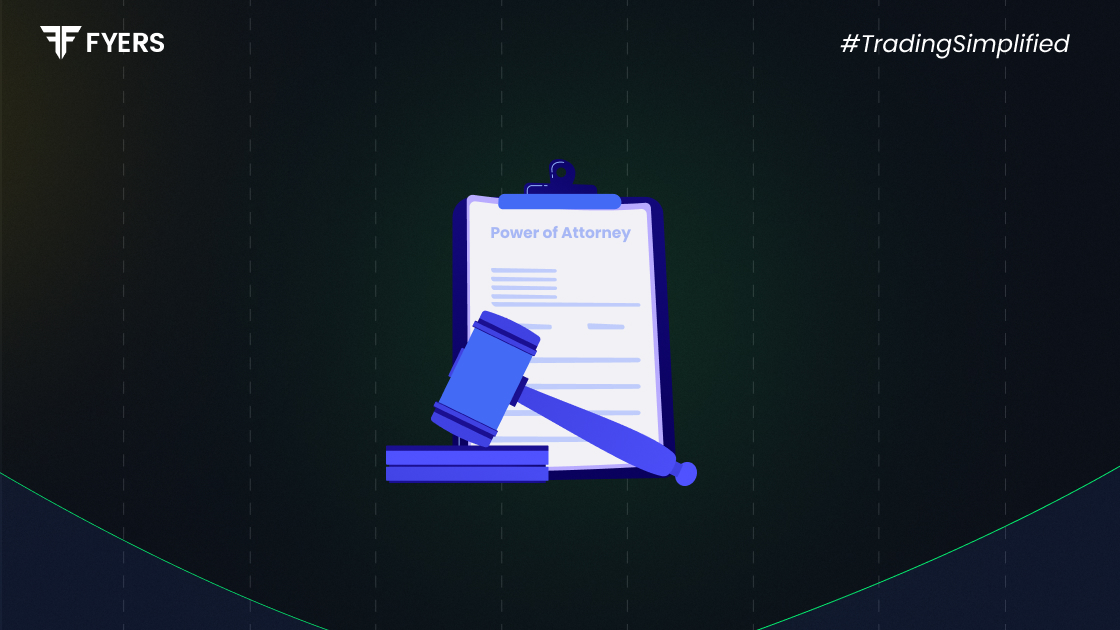

 25 Aug, 2025
25 Aug, 2025
 4 mins read
4 mins read

When investors open a demat account to trade in shares or other securities, they often come across the term Power of Attorney (POA). While it might sound like a legal formality, it plays a crucial role in making transactions smooth and hassle-free. Understanding what POA means in the context of stock trading helps investors make informed decisions about granting this authority and knowing the risks involved.
At its core, a power of attorney is a legal document that allows one person to authorise another to act on their behalf. In everyday life, it is often used for managing property, finances, or medical decisions.
In the context of investing, POA in a demat account gives a broker permission to carry out certain activities for the investor. For example, when you sell shares, the broker needs access to debit those securities from your demat account and transfer them. Without this authorisation, every trade would require manual signatures and paperwork, slowing the process considerably.
Thus, granting a POA ensures faster settlement of trades, particularly in online trading, where speed is essential.
Not all POAs grant the same level of control. There are two major types of power of attorney:
This provides wide-ranging authority to the appointed person. They can handle multiple financial and legal tasks on behalf of the account holder. While comprehensive, it can pose risks if misused.
Here, the authority is restricted to particular functions. In the case of a demat account, this usually includes limited rights such as transferring securities for settlement when the investor sells them.
For most retail investors, the limited POA is the standard practice, as it balances convenience with security.
When you open a demat account, especially with discount brokers and full-service brokers, you are usually asked to sign a POA for demat account. This enables the broker to:
Debit shares from your demat account when you sell them.
Pledge securities if you use them for margin trading.
It is important to note that the POA does not allow brokers to withdraw funds from your bank account. It is limited to activities necessary for executing and settling trades.
In recent years, regulators have introduced stricter norms to protect investors. Many brokers now use alternatives like e-DIS (Electronic Delivery Instruction Slip), which enables one-time authorisation for each trade, reducing the need for a traditional POA.
While POA in demat accounts is a common industry practice, some investors hesitate to sign it due to concerns about misuse. Possible risks include:
Excessive control: If the document grants broader authority than required, it could give the broker unnecessary powers.
Misuse of securities: In rare cases, unethical practices may involve pledging or transferring shares without proper consent.
Dependence on the broker: Once granted, revoking a POA requires formal documentation, which some investors find inconvenient.
To address these concerns, always:
Ensure it grants only limited powers related to trade settlement.
Ask your broker about available alternatives, such as e-DIS or online authorisation systems.
With digital transformation in stock trading, alternatives to POA are gaining popularity. Some options include:
e-DIS (Electronic Delivery Instruction Slip): A secure digital approval system where investors authorise each sale of securities online.
TPIN authorisation (Transaction Personal Identification Number): A unique code provided by depositories such as CDSL, which investors enter to validate transactions.
One-time mandates: Certain brokers offer systems where investors pre-approve transactions with strict limits on scope and validity.
These alternatives reduce dependency on POA and give investors more control over their holdings while still enabling seamless online transactions.
Consider this example:
Ravi, an investor, holds 200 shares of a company in his demat account. He decides to sell them through his broker’s online platform. When he places the sell order, the shares must move from his demat account to the exchange for settlement.
If Ravi has not signed one, he must provide an e-DIS authorisation or enter his TPIN to complete the sale.
In both cases, Ravi’s shares are debited and the proceeds are credited to his trading account. This demonstrates how POA (or its alternatives) ensures smoother execution of stock trades.
A power of attorney in a demat account is designed to simplify the process of trading and settlement by authorising brokers to act on behalf of investors for specific functions. While convenient, it is important to understand the scope of authority granted and opt for limited powers rather than broad rights.
With regulatory changes and the rise of digital alternatives like e-DIS and TPIN, investors today have more control and flexibility than ever before. By being aware of the role and risks of POA, one can trade with confidence while safeguarding their securities.
It is a legal document that allows one person to authorise another to act on their behalf. In investing, it lets brokers carry out specific actions in demat accounts.
It enables brokers to debit securities for settlement when an investor sells them, making trading faster and more efficient.
No, it is not compulsory. Many brokers now use digital alternatives like e-DIS or TPIN for authorization.
The two main types are General POA, which grants broad powers, and Limited POA, which restricts authority to specific actions such as handling trades in demat accounts.
Calculate your Net P&L after deducting all the charges like Tax, Brokerage, etc.
Find your required margin.
Calculate the average price you paid for a stock and determine your total cost.
Estimate your investment growth. Calculate potential returns on one-time investments.
Forecast your investment returns. Understand potential growth with regular contributions.